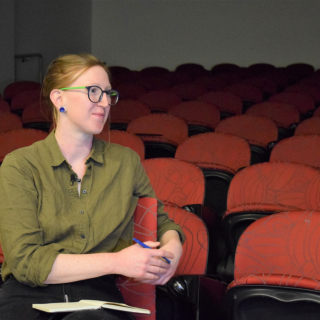Graduate Certificate of Climate Policy

Overview
There has never been a better time to upskill, retrain, and change tracks. The Graduate Certificate of Climate Policy is the new gateway for you to become a climate change specialist and climate policymaker in the Australian Government National Priority area.
View the introductory video here
Study in-person or online
In 2025, all graduate courses offered by the Crawford School will be available for either in-person or online study. All students are expected to attend live sessions at particular times each week for their courses. Crawford online courses are not ‘study at your own pace’. International students studying on an Australian student visa should enrol in in-person courses.
Participation
Real-time interaction, discussion and debate between students and with convenors is an central part of the learning experience. Attendance at interactive classes is important for both on campus and online students.
Why study climate policy at Crawford School
You will have the opportunity to develop a cutting-edge understanding of climate policy and interact with the world’s leading researchers and other future leaders and practitioners in this field.
The design of the program aims to prepare you to become a climate change professional tackling the global challenges of climate change and being part of the climate change policy making process.
You will explore fundamental concepts, contemporary issues, and leading practices for working in and researching climate policy. The program centres key issues in domestic and international climate policy such as emissions reduction and energy, and the effective communication of climate policy. Study of these key issues is enriched with intersecting and adjacent policy areas including water, food, pollution, and disaster risk reduction.
The program is well placed to be a stepping stone, and credited, toward further study in the Master of Climate Change program at the Crawford School.
What you will gain from the study
Climate change studies have been identified as a national priority in terms of workforce needs.
This flexible opportunity for upskill and retrain will equip you with both the theoretical knowledge and the practical skills needed to understand current issues in climate policy; respond to challenges relating to management, implementation and evaluation of climate policy issues; reflect critically on climate policy issues and practical challenges in diverse contexts; and demonstrate familiarity with research principles relevant to the field of climate policy.
Students will engage in a six-month full-time or equivalent part time study for 24 units from a selected list of climate policy related courses offered by Crawford School of Public Policy and Fenner School of Environment and Society at the ANU. The listed courses all address critical contemporary issues in climate policy while providing the student with choice to pursue the topics most relevant to them.
This program caters to students that are seeking shorter postgraduate offerings and online study options. It creates a pipeline into the Master of Climate Change (MCLIM) through aligning the course offerings in the program with those required for completion of the MCLIM.
After completion of the study, you would be able to
• Demonstrate understanding of current issues in climate policy
• Respond to challenges relating to management, implementation and evaluation of climate policy issues
• Reflect critically on climate policy issues and practical challenges in diverse contexts
• Demonstrate familiarity with research principles relevant to the field of climate policy
• Bring forward credits for your further study for the Crawford School’s Master of Climate Change.
Application Deadlines
Please note application deadlines are different for domestic and international students.
Domestic students
This program is without Pre-Sessional Program (PSP) component for domestic students.
• Semester 1 2025 intake:
Application closing date: 31 Jan 2025
Acceptance date: 12 Feb 2025
Start date: 17 Feb 2025
• Semester 2 2025 intake:
Application closing date: 30 June 2025
Acceptance date: 14 July 2025
Start date: 21 July 2025
International students
Find ANU’s general application and acceptance deadlines by visiting the webpage linked here.
Key dates for application:
• Semester 1 2025 intake for private applicants:
Application closing date: 31 Oct 2024
Final acceptance date: 1 Dec 2024
Start date: 13 Jan 2025
• Semester 1 2025 intake for scholarship/partnership applicants:
Application closing date: 15 Dec 2025*
Final acceptance date: 3 Jan 2025
Start date: 13 Jan 2025
• Semester 2 2025 intake for private applicants:
Application closing date: 15 April 2025
Final acceptance date: 15 May 2025*
Start date: 12 June 2025
• Semester 2 2025 intake for scholarship/partnership applicants:
Application date: 15 April 2025
Final acceptance date: 15 May 2025*
Start date: 12 June 2025
*Some students may need to accept well before this date to allow for visa processing times in their country.
View the full program structure, admission requirements and academic information.
To find out more, contact us today at crawford.degrees@anu.edu.au.
Degree structure
All of these courses incorporate research-based assessment activities and each draw on case studies that utilise current ANU research often by the convenors themselves who are world leaders in their fields.
The Graduate Certificate of Climate Policy may be completed in a single semester full-time or part-time equivalent. Students can participate in the program online, in person and in a mixed mode of flexible learning and communicating.
You may also wish to consider extending the Graduate Certificate of Climate Policy to complete a Master of Climate Change to develop a truly world-class expertise in your chosen area. We’ll count your study in the Graduate Certificate towards credit for the Master degree.
Duration
Six months full time equivalent
Admission requirements
• A Bachelor degree or international equivalent with a minimum GPA of 4/7.
Program structure
The Graduate Certificate of Climate Policy requires the completion of 24 units selected from a range of key courses to support upskilling and retraining in this Australian Government national priority area.
View the detailed degree program structure, admission requirements and academic rules information.
Your career
When you complete this Graduate Certificate program, a wide range of local and international employment pathways may open up to you as you upskill or retrain in this area of national priority.
Increasingly, employers across business, government, and other sectors actively recruit graduates who demonstrate knowledge and experience in the Asia-Pacific region. This means our graduates can be found all over the world in diverse and exciting fields such as:
• climate change policy;
• management, implementation and evaluation of climate change related policy;
• research relevant to the field of climate policy; and
• regional, national and international policy formulation.
Academics
Keith Barney
Associate Professor & Head of Department: Resources, Environment, and Development Group
Contact details
Quentin Grafton
Professor and Laureate Fellow; Chairholder UNESCO Chair in Water Economics and Transboundary Water Governance
Contact details
Frank Jotzo
Professor, ANU Crawford School of Public Policy; Head of Energy, ANU Institute for Climate, Energy and Disaster Solutions.
Contact details
Kuntala Lahiri-Dutt AO
Professor, Resource, Environment and Development (RE&D) Program.
Contact details
John McCarthy
Professor, Crawford School; Resources Environment and Development program.
Contact details
Scholarships and fees
Tuition fees, aid and scholarships
Costs associated with your study at ANU will depend on a number of things, including your study program and whether you’re a national or international student.
Find out more about costs and fees associated with studying at ANU.
Postgraduate Commonwealth Supported Place (CSP)
CSP is one of the Commonwealth help schemes and is available for domestic students. With a CSP, you will save a significant amount of money on the tuition fee. The Postgraduate CSPs are limited and highly competitive. To be eligible:
• You must be a domestic student ie Australian citizen, New Zealand citizen, Australian Permanent Resident or holder of a humanitarian visa.
• You must be a continuing or commencing Graduate Coursework student*.
• Research based programs including the Master of Philosophy (MPhil) and Doctor of Philosophy (PhD) are not eligible as the fees for these are already covered by the Research Training Scheme (RTS).
• Non-award study is not eligible.
*As a continuing student, you need to complete at least 24 units of study at ANU in the postgraduate programme you wish to be considered for a CSP.
For more detailed information, please visit ANU’s webpage for a CSP: https://www.anu.edu.au/students/program-administration/fees-payments/postgraduate-commonwealth-supported-places
Updated: 5 November 2024/Responsible Officer: Crawford Engagement/Page Contact: CAP Web Team



























